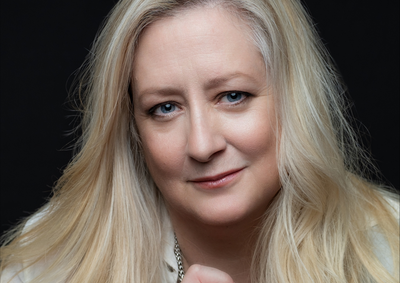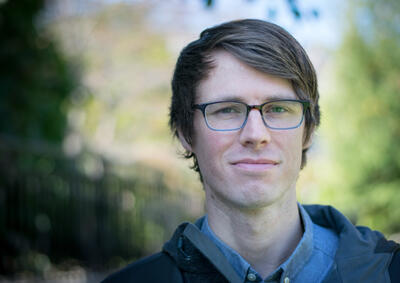Feast of Music: Conversation with Roomful of Teeth's Brad Wells '05 DMA
Feast of Music
By Peter Matthews
It's been an exciting year for contemporary vocal ensemble Roomful of Teeth, whose debut album (New Amsterdam) — including Caroline Shaw's Pulitzer Prize-winning Partita for 8 Voices — is up for three GRAMMY Awards this month, including Best Chamber Music/Small Ensemble Performance. I had the chance to sit down a couple of weeks ago with Roomful of Teeth's Founder and Director, Brad Wells, to talk about the group's working methods and influences and why they're not "a &$%ing choir!" (Note: Roomful of Teeth will be performing as part of the upcoming Winter Jazzfest at Judson Memorial Church next Friday, January 10 at 945 p.m. Tickets and info here.)
On Starting Roomful of Teeth: There were these hard lines that had been drawn between classical voice pedagogy and everything else. The mentality was: keep everything else out, because everything else is an inferior use of the voice. But, thinking about how long people have been using their voice in different parts of the world, how could those other techniques be wrong?
I love a throaty or a belchy voice. I love yodeling. I love voices when they crack. I love hearing grit in the voice. As a young composer, I thought: Well, those are really just colors, the same way an oboe is a different variant of a wind instrument from an English horn or a clarinet. So, it seemed like a given to me that composers would enjoy writing for the voice in dramatically different gears: from bel canto, to throat singing, to all of these different kinds of techniques. Once I knew we could stretch the singers without damaging them, and once I knew I could find the right teachers from different vocal disciplines, I knew this was going to work.
On Teeth's Identity: We've definitely looked to other vocal groups as role models: Chanticleer, NY Polyphony, Austin's Conspirare, Seraphic Fire in Miami. But, at the same time, we aren't like any of them. In fact, we have this mantra: “We’re not a f*cking choir!” We like to think of it as a band. A band doesn’t get caught up in thinking about who’s going to be covering this stuff in the future. Just do your music, and whatever happens, happens.
On Finding the Right Singers: At first, I didn’t start with classically trained singers. I auditioned a lot of people from the musical theater world, thinking that in the theater, you're expected to use your voice in several different ways. Not to mention, that’s the one style of singing these days where people are taught how to “belt.” But, the musicianship skills across the board weren’t strong enough: musical theater singers aren’t trained to sight read lots of music, they’re trained to learn roles. So, it was really just a question of finding singers who were open, who seemed flexible enough vocally, and who had great musical chops.
On Working With Composers: The success rate has been surprisingly high. I feel like there’s something about the ethos of the group, the fact that composers haven’t written for this particular machine before. We set it up so they can try things out, get to know the singers individually. We have a chart that we update that lists each singer and their range: if they’re singing in their chest voice or their falsetto, this is where they yodel and their breaks work the best, this is their range for throat singing, etc. We have little notes like: I can only do this for about 10 seconds before I need a break.
Sometimes when the group is building new techniques into their vocabulary, I’ll draw the composers’ attention to aspects of those techniques that I think are interesting or unique. For example, we were studying Korean P’ansori, which is sort of a high blues that uses vibrato in a very particular way. I showed this to Merrill Garbus (tUnE-yArDs), and within the hour, she had constructed a section of a piece using it.
Judd Greenstein’s ['04 MM] AEIOU, which he wrote during our first summer residency at Mass MoCA, asks the singers to yodel up from their chest voice to their head voice, in tune. Everyone at first thought: Jesus, this is really hard. But, we performed it again a year later, after it had sat in our ears for awhile and we had done lots of other yodeling. And, it was like, “Oh, this isn’t that hard anymore.”
On Discovering Caroline Shaw ['07 MM]: When I met Caroline and heard her, she had such a beautiful, pure sound, but wasn't trained to have a big voice. But, knowing that we were going to be miking the singers and were looking for flexibility in musicianship, she definitely fit the bill.
On Partita for 8 Voices: During that first summer at Mass MoCA, we had Judd and Rinde Eckert ['75MM] writing for us. But we needed music for a full program, and I was certain that I didn’t want to do any music that hadn’t been written for the group. So, I basically went to the group and said: Help me out here, kids! Several of them did, and Caroline’s piece jumped out right away.





